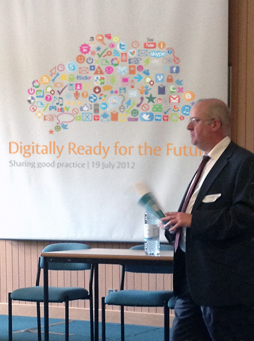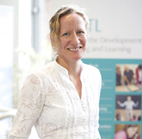It’s been a few weeks since the Digitally Ready day now, which is probably about the right amount of time for some reflection on the day and the project as a whole. As a quasi-outsider to the project, I was impressed by the organisation, the range of sessions, and the number of people who attended.
The morning offered a choice of parallel show-and-tell sessions. My own talk was one of the first on offer, which unfortunately meant that I didn’t get to choose which I could attend! I have had the privilege of attending one of Karsten’s workshops on games and workshops before and I have also been involved in video work in CDoTL before so it was a shame not to be able to see either of the other first sessions.

Some of the speakers at the ‘Sharing Good Practice’ event: Rachel McCrindle, Alastair Culham, Matthew Nicholls, Gerry Leonidas
When I was done, however, I did make it to Rachel McCrindle’s talk on developing both subject-related and soft skills within the software engineering module she delivers. The module is compulsory for first years meaning that Rachel has about 200 students to teach. Strangely, this makes the innovation she has brought to her teaching seem both a necessity but also quite daring. One of the aims of the module is that students must design a board game that will teach novice software engineers about software engineering. This approach not only realises that old adage about teaching being the only way to learn something well; it means learning can also happen on a series of meta-levels, opening up possibilities for students to think about the ways in which they learn. The teaching of the soft skills happens through the forming of teams, the identification of roles, and then of course the planning and work that happens as a result. At the end of her talk, Rachel treated us to some videos that the students created to advertise their games, which showcased not only the games but also the fun the students clearly had making them. Given that they all had the same specification the game designs and videos varied wildly.
After that, I was on hand to help out with Andi Nygaard’s talk on PollEverywhere, a piece of polling software that can be used to gather opinions by text. I was already familiar with the work that Andi and his colleague Simon had done using the tool for a live debate in the School of Economics, but the talk was a useful short overview of the project and contained some further reflections on use of polling software in a live class. For example, of all the text messages that came through during the debate only half were suitable for display on the screen behind the speakers; though inappropriate messages weren’t shown during the debate, Andi wondered if sending them out to all the students afterwards would show the varying levels of engagement the School was having to deal with.

Paul Bailey, JISC Programme Manager
Being actively involved in two of the sessions, I was less able to attend everything than even the morning’s parallel programme would allow. But the afternoon’s single stream of short talks allowed for a common experience and therefore more debate. The VC’s talk was an enthusiastic opening to the afternoon and offered a promising outlook – if IT in schools has not led to ‘transformation’ so much as ‘substitution’, could HE, in this respect, ‘lead the way’? Paul Bailey was on hand to put the project into a the broader national context.
Alastair Culham’s talk helped define digital literacy which the Digitally Ready seeks to bring about – essentially, knowing which bits of information are useful and where they come from. This usefully framed the digital literacy as part of a broader academic skill set, of which general information literacy is such a key component. In talking about the advantages of using blogs and Facebook, he called the audience to ‘think beyond Blackboard’ for a variety of areas – for making students aware of copyright issues to surveying and statistics. The added advantages of these tools, including the University’s own WordPress installation (on which this and Alastair’s own blog are hosted), is the potential for outreach and internationalisation.

Virtual Rome: The Theatre of Marcellus, built by Rome’s first emperor Augustus, played a prominent role in his great Secular Games.
Gerry Leonidas’ talk was an interesting demonstration of how new tools are making old things more interesting. The demand for typographical representation of ancient text, for example, is actually driving the cutting edge. This point was supported by Matthew Nicholls’ talk on his MA City of Rome course. Such a course in Classics has traditionally involved two dimensional architectural plans and drawings. Rather than seeking to make students more literate with these more traditional methods, Matthew has instead asked why Classics students should be, given that they are not studying architecture. Using Google’s free SketchUp tool, he has created virtual three dimensional models of buildings and is working towards a model of Rome as it appeared AD 300-350, in order to help students to get to the material they should be familiar with. This approach is new to the humanities and has what the REF like to call huge ‘impact potential’. What amounts to a very sophisticated data visualisation project has benefits for research too – as Matthew demonstrated with his visualisation of the Theatre of Marcellus at different times of day, providing clues as to the scheduling of plays.

Digitally Ready Project Manager Maria Papaefthimiou in conversation with delegates.
What I took away from the day, from the range of examples on offer and from the discussion on-going throughout, is that being digitally ready is about being able and willing to use digital technology as a way of working faster and better and as a way of finding new ways to work. These two often cross over – engaging with digital technology means changing the way you do something and thereby doing something new. Sometimes, it even means having to re-realise your aims, as Matthew has with his Classics course. Technology was always meant to be labour-saving, not laborious, and shouldn’t be a hurdle so much as a starting-block. And, if I can extend the topical metaphor a little further, I think the day showed that Digitally Ready is the chevron pointing the way.











